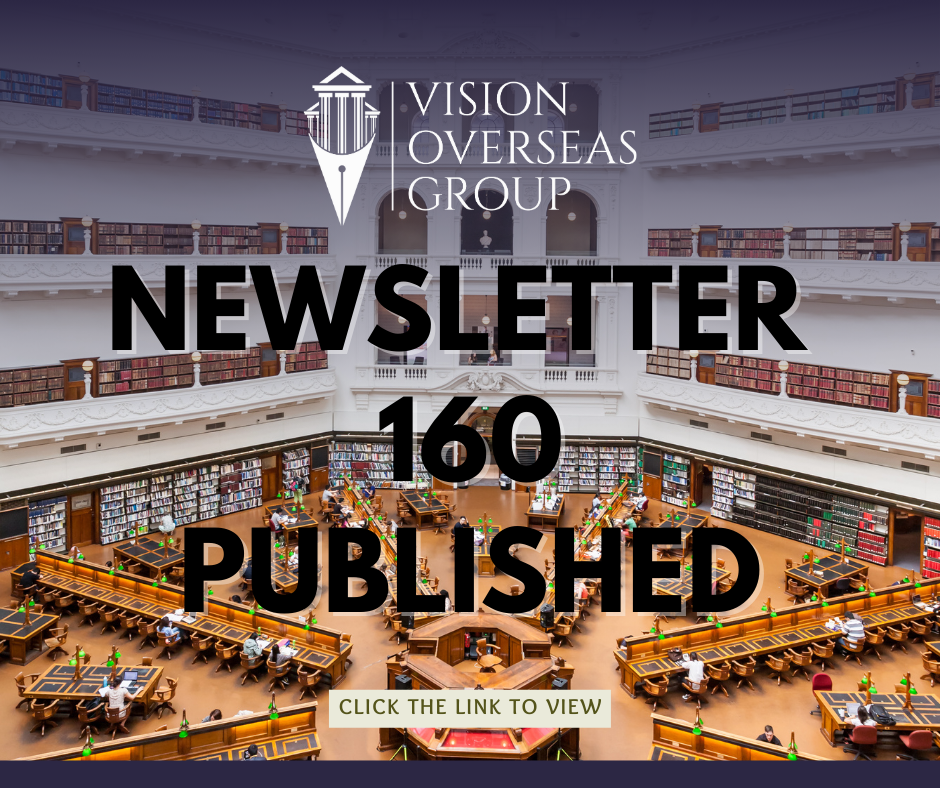
Newsletter 160
Download Newsletter
Victoria’s Skilled Migration Program is now open.
The programme offers skilled immigrants a route to permanent residency in Victoria and is available to applicants living in Victoria and abroad.
The programme offers two ways to obtain a visa:
• Skilled immigrants can live and work anywhere in Victoria with a permanent visa called the Skilled Nominated visa (subclass 190).
• The Permanent Residence (Skilled Regional) visa (subclass 191) offers a road to permanent residency for skilled migrants who wish to live and work in regional Victoria. The Skilled Work Regional (Provisional) visa (subclass 491) serves the same purpose.
You must first submit a Registration of Interest (ROI) in order to be chosen for selection for Victorian skilled visa nomination.
Changes for the 2023-24 program
Changes to the Skilled Work Regional (Provisional) Visa (Subclass 491)
Onshore applicants must be residing and employed in regional Victoria at the time of nomination in order to be eligible to apply for a Skilled Work Regional (Provisional) visa (subclass 491) nomination in the 2023–24 programme. The Department of Home Affairs includes a few of Melbourne’s outer suburbs in its regional zones.
Due to this modification, if you applied for a subclass 491 ROI in 2022–2023 and were not chosen, you will need to reapply if you are still qualified.
Visa for skilled workers (subclass 190)
The subclass 190 visa nomination programme has not changed.
Unless the information provided has changed, you do not need to submit a new ROI if your subclass 190 Registration of Interest from 2022–23 was rejected. Please double-check your partner points and annual salary responses in your current ROI to make sure they are accurate in addition to your EOI. Please remove the current ROI and submit a new one if they are incorrect.
Selection rounds
A Registration of Interest is not a nomination request for the Victorian visa. There is no specific period of time during which you will be chosen because the programme is extremely competitive.
Until it is withdrawn or chosen, your ROI will stay in our system for selection. The programme will end at an undetermined time in early 2024.
Learn more about the Skilled Migration Visa Nomination Programme for 2023–24.
Keen Kiwis commit to Australia
At a ceremony today in Werribee, a Kiwi couple who reside in Melbourne’s western suburbs will become the first New Zealanders to acquire Australian citizenship under the Albanese Labour Government’s new direct pathway to citizenship.
The small business owners have lived in Australia for over 15 years, but until now, they haven’t been able to identify as Australians, stating that “[our] children live and work here; they pay taxes and we have made a comfortable life for ourselves here, so why not live here fully and take advantage of everything this beautiful country has to offer, including the ability to vote.”
The couple, who joined the programme just 70 days ago, will pave the way for more than 100 other eager Kiwis who have already committed to a citizenship ceremony in the coming months. Thirteen of them will become Australian citizens at a ceremony at Parliament House in Canberra next week to celebrate Australian Citizenship Day.
Following Victoria-based Kiwis who had already passed their citizenship exam and leaped at the chance to become Australians, Queensland and New South Wales each accounted for about 25% of tests passed.
As long as they have lived in Australia for four years, New Zealand citizens who hold Special Category Visas can now apply directly for citizenship by conferral under the historic direct pathway to citizenship established by the Albanese Labour Government, bringing our policy closer to the advantages that Australians who reside in New Zealand already enjoy.
TRA – Changes to Offshore Skilled Assessment Programs
Recognition of Trades The Offshore Skills Assessment Programme will no longer require the remaining passport holders from the following nations to undergo a skills assessment:
Brazil, China, Fiji, Guam, Hong Kong Special Administrative Region, India, Iran, Ireland, Macau Special Administrative Region, Philippines, Republic of Korea, Sri Lanka, Thailand, United Arab Emirates, United Kingdom, Vietnam, and Zimbabwe.
All certified vehicle painters may begin applying for a skills evaluation on Monday, September 11 under the less complicated and more affordable Migration Skills Assessment programme. Before enrolling for the MSA programme, unqualified applicants must receive a qualification from their home country, their country of residence, or through an Australian RTO.
State and Territories Update
Queensland
Migration The state-nominated skilled migration programme for 2023–24 has begun in Queensland. Queensland had gotten a much less number of slots for this programme year than had the other states and territories.
In order to ensure an evenly distributed workload throughout the programme year, Queensland will start inviting selected applicants at the end of this month and hold invitation rounds at the end of each month.
Criteria for all paths are now available on the Migration Queensland website, including:
The QSOL, or Queensland Offshore Skilled Occupations List,
- Skilled workers onshore
- Skilled workers offshore
- Graduates of a Queensland university
- 491 Small Business Owners (SBO) pathway
International Students – Visas and compliance
- Increasing savings is necessary.
From October 1, 2023, overseas students will have to provide proof of savings totaling $24,505. This translates to the equivalent of indexation since 2019 and represents a 17% rise over the existing levels, taking into account the increases in living costs since that time.
- Changing directions
The Government has revised the options available to international students who have been studying in Australia for less than six months, allowing them to switch from legitimate study to options like “concurrent enrolment” that made it easier for them to work there.
- Fit and suitable individuals
High-risk education providers may receive suspension certificates under Section 97 of the Education Services for Overseas Students Act (ESOS Act). More than 200 providers have been identified by the government with 50% higher rates of visa refusal.
- Aged care work concessions
The ability to change employers while still receiving the concession to the working hours cap for students on student visas who work in the elderly care industry has been requested by applicants. This concession is valid until the end of December 2023.
Absence of 5 years does not prevent Child from getting Citizenship on 10TH Birthday
OVERVIEW:
In this case, Master Gurnoor Singh Sidhu was born in Australia on 21 March 2010. At the time of his birth, Sidhu’s parents were not Australian citizens; they held temporary visas and were non-citizens residing in Australia. As per Australian law, children born to non-citizen parents in Australia are granted birthright citizenship, but they must meet specific criteria to acquire citizenship.
One such criterion is the requirement for the child to be an “ordinary resident” in Australia from birth up to their 10th birthday. The definition of an “ordinary resident” in the context of citizenship has been a subject of legal debate, leading to the need for clarification in this case.
KEY ISSUE:
The primary issue before the court was whether Sidhu met the definition of an “ordinary resident” in Australia and, as a result, was eligible to acquire Australian citizenship upon turning 10 years old. The Minister for Immigration, Citizenship and Multicultural Affairs argued that Sidhu’s parents’ temporary visa status and potential travel outside of Australia during the child’s early years should disqualify him from being considered an “ordinary resident.”
COURT’S DECISION:
Initially, that application was approved, and on June 3rd, 2020, a certificate proving citizenship was issued. But only a few weeks after that incident, there would appear to have been doubts about the validity of the administrative decision that had led to the issuance of that certificate within the department now overseen by the Minister for Immigration, Citizenship, and Multicultural Affairs. The father of Master Sidhu received word that the evidentiary certificate will be cancelled. A representative of the Minister determined on October 2, 2020 that Master Sidhu was ineligible for Australian citizenship and subsequently revoked the evidential certificate. Although Master Sidhu requested an internal review of the choice, it was unsuccessful. On February 24, 2022, a further representative of the Minister decided to affirm the cancellation decision.
RESOLUTION OF THE APPEAL:
In a historic decision, the court ruled in favor of Sidhu and his litigation representative, Kaur. The court held that temporary visa status alone should not preclude a child born in Australia from being recognized as an “ordinary resident.” The court considered various factors, including Sidhu’s continuous presence in Australia, his education, community involvement, and family ties, to conclude that he indeed met the definition of an “ordinary resident” in Australia.
Sydney solicitor admits deception of David Jones in failed defamation bid
Aged care work concessions
A Sydney lawyer who testified that he committed fraud in a David Jones store lost his defamation lawsuit against a small website.
Simone Selkirk admitted lying to David Jones on 17 different occasions over the course of two years by producing fake online purchase invoice emails in order to get a reimbursement for “returned goods” during testimony before the Federal Court.
She was found guilty of dealing with the proceeds of crime on seven charges and was found guilty on 16 counts of dishonestly acquiring a financial benefit by fraud. Because the prosecution was unable to show how Ms. Selkirk obtained the products, she was able to successfully appeal all of her convictions.
The sole specific or substantial harm, according to Justice O’Callaghan, was that Ms. Selkirk’s “professional reputation depends on her integrity as an admitted member of the legal profession,” which had been put at “serious risk” by the imputations.
“The immediate difficulty with the plea, and with the evidence led in support of it, is that neither address[es] the critical question of whether the publication of the article caused any, let alone any serious, harm to Ms Selkirk,” said Justice O’Callaghan.
For these reasons, Justice O’Callaghan concluded that Ms. Selkirk had not established that the publication had really caused or posed a serious risk of doing so.
Related posts
Newsletter 200
Business Innovation and Investment Program (BIIP) (Sc 188) Closure The Migration Regulations 1
Newsletter 199
VETASSESS Updates Accepting application for Electrician & Metal Machinist Starting 15 July 2
Newsletter 198
Visa Application Charge 1 July 2024 The Migration Regulations are amended to implement the ann




